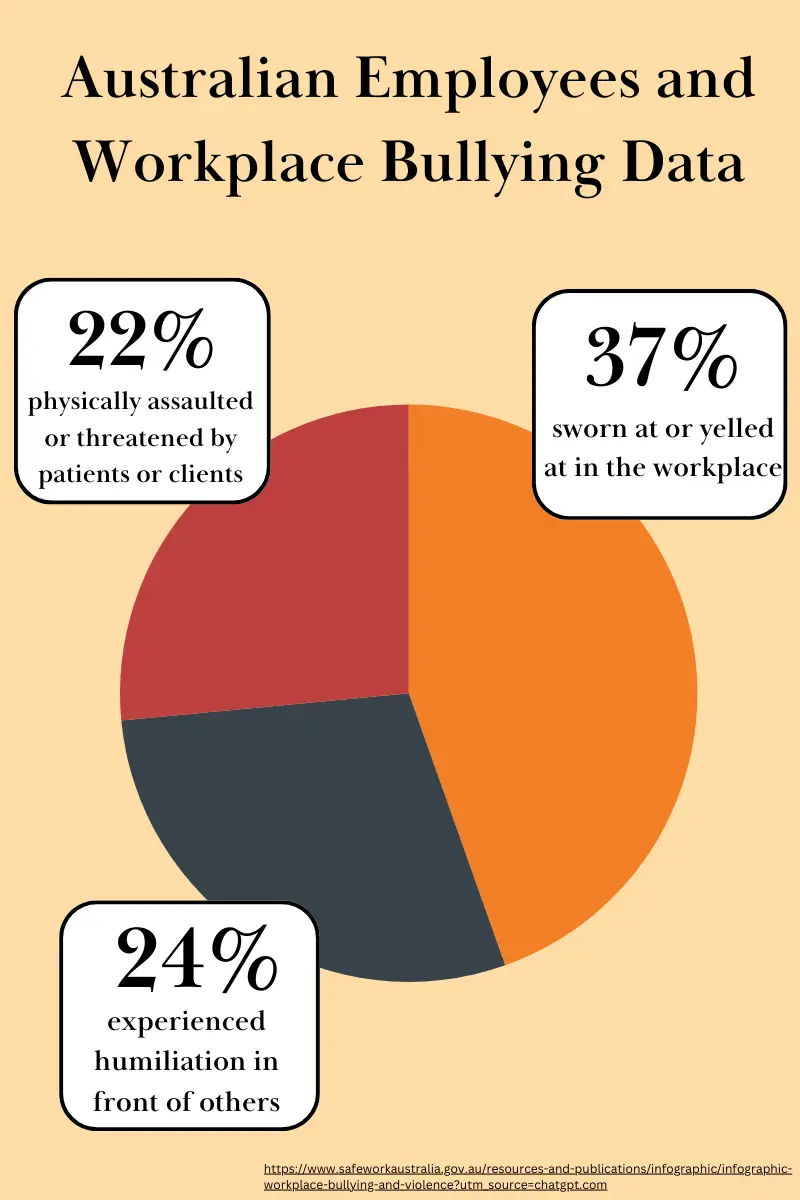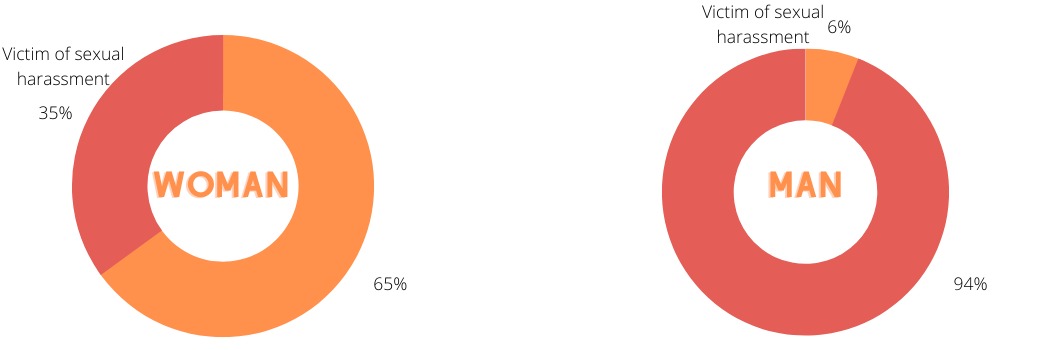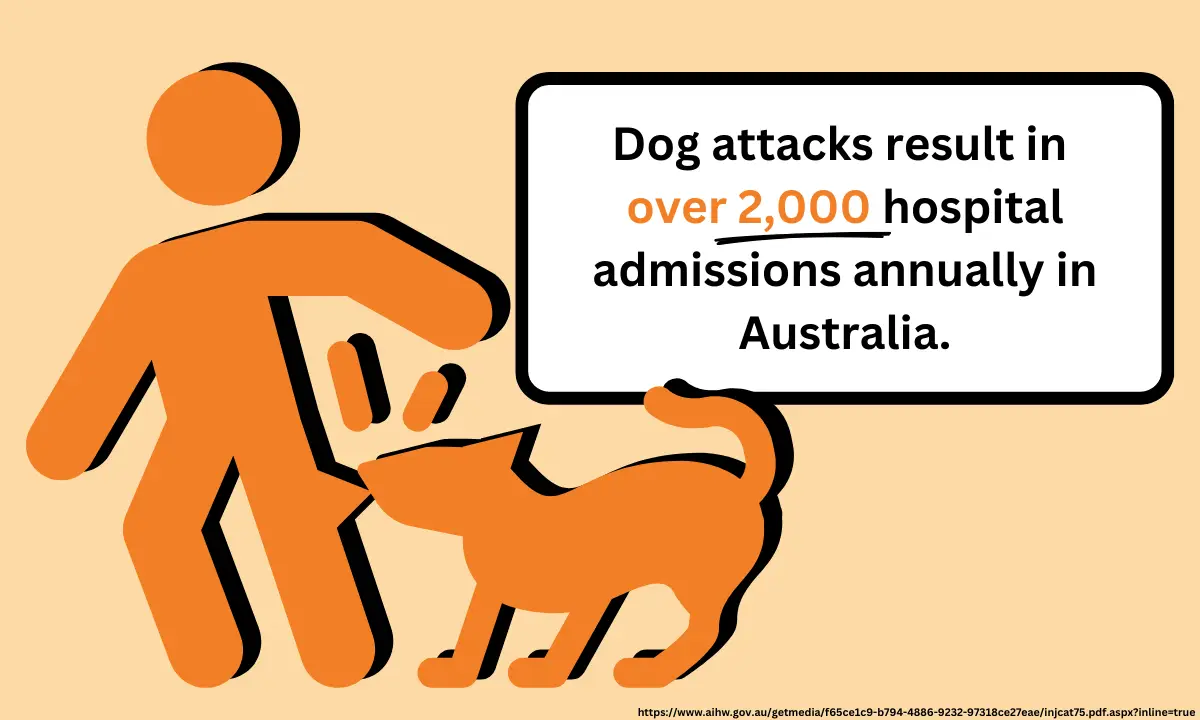Every employee has the right to a safe and respectful workplace, free from bullying, harassment, and discrimination. But what if actions like a transfer, demotion, promotion, performance review, discipline, retrenchment, or dismissal cause psychological harm? Is this considered bullying in a workplace?
In this blog, we’ll explain when such actions are deemed workplace bullying, your entitlements to compensation, and how a workplace harassment lawyer can help you make a workplace bullying and harassment claim.

The Data Around Workplace Bullying in Australia
Workplace bullying is a widespread issue in Australia, affecting employees across various industries. Recent data highlights the extent of the problem and its impact on workers’ mental health and productivity.
Prevalence of Bullying
According to Safe Work Australia, approximately 9.4% of Australian workers reported being bullied in the workplace over a six-month period. In the Australian Public Service, this figure increases slightly, with 9.7% of employees reporting bullying or harassment within the past year.
Types of Bullying Behavior
Safe Work Australia identifies several common forms of workplace bullying, including:
- Swearing or Yelling: Reported by 37% of workers.
- Public Humiliation: Experienced by 24% of employees.
- Physical Threats or Assaults: Reported by 22%, particularly in roles involving interactions with clients or patients.
Psychological Impact
Workplace bullying contributes significantly to mental health issues, with 39% of mental disorder claims attributed to bullying, harassment, or exposure to workplace violence. These claims often involve conditions such as anxiety, depression, and post-traumatic stress disorder (PTSD).
Industries Most Affected
Certain sectors are more vulnerable to workplace bullying, including:
- Healthcare and social assistance
- Education and training
- Retail trade
These industries often involve high-pressure environments and frequent interactions with customers or clients, increasing the likelihood of bullying incidents.
What This Employment Harassment Data Means for Employees
The statistics emphasize the urgent need for better prevention and support systems in Australian workplaces. Employees experiencing bullying should feel empowered to seek help, whether through internal reporting mechanisms or by consulting workplace harassment lawyers for legal advice and support.
If you’re facing workplace bullying, don’t hesitate to take action. Protect your rights and well-being by reaching out to our team of workplace harassment lawyers.

- No Upfront Costs
- No Win No Fee
- 99% Success Rate
- Maximum Lump Sum Payout
- No Upfront Costs
- No Win No Fee
- 99% Success Rate
- Maximum Lump Sum Payout

Our workplace bullying and harassment lawyer provide a free claim check!
What Exactly Is Bullying in a Workplace?
The Fair Work Ombudsman’s workplace bullying definition is a person or group of people repeatedly behaving unreasonably towards another worker or group of workers. Given that the definition is broad, it can be better understood with some examples below.
- Teasing or telling inappropriate jokes
- Starting rude and/or inaccurate rumours
- Humiliating comments
- Aggressive behaviour
- Exclusion from work-related events
- Unattainable and/or unreasonable work expectations
Its important to note that workplace bullying is different to workplace discrimination and as a result, you could be entitled to a separate claim under employment law and Human Rights claims.
What about Workplace Harassment and Discrimination?
Workplace harassment and discrimination is when someone is treated differently or less favourably because of a personal attribute such as:
- Age
- Gender
- Race/Nationality
- Religion/Belief
- Marital status
- Pregnancy
- Disability

One in eight men between 25 – 34 years of age admitted that they were harassed or discriminated against by their female co-workers.

There’s a dramatic difference between men and women when it comes to being a victim of sexual harassment. Women are 6 times more likely to experience sexual harassment than men.
I've Been Bullied at Work. Can I Make a Workplace Bullying Compensation Claim?
Yes, you can make a workplace bullying compensation claim – but certain conditions must be met.
To qualify for compensation, your injuries must result directly from workplace bullying and be diagnosed by a medical professional as a psychological injury. General feelings of anxiety, sadness, or frustration, while distressing, are not sufficient on their own to constitute a diagnosable psychological injury for a claim.

How Can a Workplace Harassment Lawyer Help You?
Dealing with bullying or harassment can be daunting, but an experienced lawyer can guide you through the process.
Key Ways Workplace Harassment Lawyers Assist:
- Understanding Your Rights: Our workplace bullying lawyers can explain the laws protecting you and assess whether your situation qualifies as bullying or harassment.
- Gathering Evidence: Assistance in collecting emails, messages, or witness statements to support your claim.
- Lodging Formal Complaints: Filing complaints with your employer, the Fair Work Commission, or relevant authorities.
- Negotiating Settlements: Our workplace harassment lawyers can help you secure compensation for damages such as emotional distress or lost wages.
What Compensation Benefits Can I Claim for Workplace Bullying?
Medical expenses
healthcare expenses related to your injuries such as psychiatric therapy and medical equipment
Weekly payments
based on your pre-injury income
Lump sum claim payment
if your physical permanent impairment meets the 15% permanent impairment threshold.
Domestic assistance
if your permanent impairment meets the 15% permanent impairment threshold.
Common law/work injury damages payout
if your employer was negligent and your permanent impairment meets 15%.

What Is a Common Law Claim for Workplace Bullying?

Common law claim includes future loss of earnings until the age of retirement, depending on the extent of negligence, the extent of your injuries, your age and other circumstances.
You can make a common law claim under workers compensation scheme if your injuries are assessed as being at least 15% whole person impairment and your employer is responsible for your injury.
How Can I Start My Workplace Bullying Claim?
Start by formally reporting the issue to your manager or supervisor in writing, even if you have not yet developed psychological injuries. This step creates a record of the bullying and demonstrates that you’ve taken action to address the issue.
Consult your General Practitioner for treatment and request they complete a Certificate of Capacity which should document your injury and their opinion on your capacity to work due to the injury.
Fill out a Work Injury Claim Form, ensuring it includes accurate details of the bullying and its impact. Attach the Certificate of Capacity completed by your GP and submit the documents to your employer or their workers’ compensation insurer.
You don’t have to face this alone. Our experienced workplace bullying lawyers have been supporting individuals facing bullying and harassment for years, offering dedicated assistance on a No Win, No Fee basis. Contact us today for a free eligibility check to understand your rights and take the first step toward your claim.
When Should I Start My Workplace Bullying Compensation Claim?
The short answer is as soon as possible.
Workplace injuries are assessed under workers compensation claims which should be made within 6 months after the date that you discover your injury, however the earlier you start the earlier you may receive your compensation benefits.
If your permanent impairment rate is 15% or greater, you should make a common law claim within three years.
There are some exceptions that may extend these durations. You can reach our common law lawyers to learn about your eligibility.

Frequently asked questions
You take certain actions to prevent workplace bullying to harm your mental health. You can start with reporting the behaviour to your manager or HR department; your employer should address the issue as soon as possible after your notification. It is best you do it in writing as you may require that later. Also, you can limit your interaction and take notes of what happened.
An experienced workplace bullying lawyer can walk you through all steps of your claim. It’s more likely that you are not experienced in that area; that’s why a workplace injury lawyer can easily identify your eligibility, plan the claiming process, estimate your compensation benefits, and most importantly, act on your behalf of you when you should focus on your mental wellbeing. There is no cost to you as our workplace bullying lawyers have approved Independent Review Office (IRO) lawyers which means you are not liable for our costs and disbursements as they are covered by IRO.
Yes, you can sue your boss if you are bullied by them but usually, you are making a claim against your employer not your boss directly. Your employer should have workers compensation insurance as required by law.
You can make a psychological injury claim if you have suffered an injury due to workplace bullying which occurred in the course of employment regardless of whether it was your colleagues, customers, patients, the management or your employer directly. However, as noted in the Who can claim workplace bullying compensation? section, your psychological injuries need to be diagnosed by a medical professional.
Reach Our No Win No Fee Workplace Bullying Lawyers
Our workplace bullying lawyers can simplify the legal procedure for you and work hard to help you know where you stand, ensuring you are receiving the maximum compensation benefits and/or the maximum payout to protect your future.
Your legal costs and disbursements will be covered by the Independent Review Office (IRO). We operate on a No Win No Fee basis, and provide a free claim assessment with no strings attached.
Call us on 1800 952 901 and book your Free Claim Check today!

Issa Rabaya
• Bachelor of Laws
• Graduate Diploma in Legal Practice
• Approved Legal Service Provider to the Independent Review Office
• Member of the Law Society

Issa Rabaya
• Bachelor of Laws
• Graduate Diploma in Legal Practice
• Approved Legal Service Provider to the Independent Review Office
• Member of the Law Society




